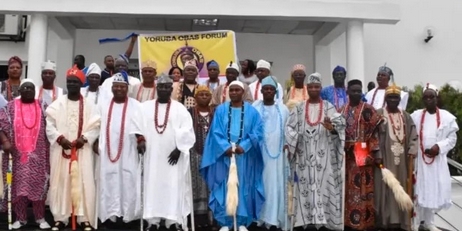
support@yorubalibrary.com
+2348073529208, 07038599574

The Yoruba people, one of the largest ethnic groups in Nigeria, have a rich tradition of monarchy and chieftaincy. Each kingdom within the Yoruba culture is ruled by a king, known by different titles depending on the location. This article explores various Yoruba kings, their titles, and the regions they govern.
Ooni of Ife: The Spiritual Leader
The Ooni of Ife is regarded as the paramount spiritual leader of the Yoruba people. Based in Ile-Ife, Osun State, the Ooni is considered the custodian of Yoruba culture and history. Ile-Ife is often referred to as the cradle of Yoruba civilization, making the Ooni a highly revered figure.
Alaafin of Oyo: The Imperial King
The Alaafin of Oyo is another prominent Yoruba king, ruling over the historic city of Oyo in Oyo State. The Alaafin's influence extends beyond his immediate domain, historically serving as a political and military leader. The title "Alaafin" translates to "owner of the palace," reflecting his esteemed position.
Oba of Lagos: The Coastal Monarch
The Oba of Lagos, based in the bustling metropolis of Lagos, Lagos State, holds significant authority and respect. The Oba plays a crucial role in the administration and cultural activities of Lagos, one of Nigeria's most important economic hubs. The title "Oba" is a common term for king among the Yoruba, but in Lagos, it carries a unique prestige.
Awujale of Ijebu: The Influential Ruler
The Awujale of Ijebu is the traditional ruler of the Ijebu people, located in Ijebu-Ode, Ogun State. Known for their enterprising spirit and rich cultural heritage, the Ijebu people regard the Awujale as both a spiritual and political leader. The Awujale's influence is significant in the region's socio-economic affairs.
Alake of Egbaland: The Esteemed Leader
The Alake of Egbaland is the king of the Egba people, headquartered in Abeokuta, Ogun State. The Egba kingdom is known for its historical resistance against colonial rule and its contributions to Nigeria's development. The Alake's title signifies his authority over the Egba clans, including Ake, Owu, Gbagura, and Oke Ona.
Olubadan of Ibadan: The Honored Sovereign
The Olubadan of Ibadan is the traditional ruler of Ibadan, the largest city in Oyo State. Ibadan, known for its historical significance and educational institutions, holds the Olubadan in high esteem. The title "Olubadan" means "lord of Ibadan," highlighting his importance in the city's governance and cultural preservation.
Soun of Ogbomoso: The Respected Monarch
The Soun of Ogbomoso presides over Ogbomoso, another prominent city in Oyo State. The Soun's role is pivotal in maintaining the cultural and historical heritage of the Ogbomoso people. His leadership is marked by efforts to promote development and unity within the community.
Olu of Warri: The Coastal Sovereign
The Olu of Warri is the traditional ruler of the Itsekiri people, based in Warri, Delta State. Although not Yoruba by ethnicity, the Itsekiri have significant historical ties with the Yoruba, particularly through intermarriage and cultural exchange. The Olu's influence is notable in the Niger Delta region.
Conclusion
The Yoruba kings, with their distinct titles and regions, play a crucial role in preserving and promoting the culture and traditions of the Yoruba people. From the Ooni of Ife to the Olu of Warri, these monarchs are not only custodians of history but also pivotal figures in contemporary socio-political landscapes. Their leadership continues to shape the cultural identity and unity of the Yoruba people across Nigeria and beyond.

Learn about the Yoruba concept of Ìwà Pẹ̀lẹ́ (good…

Learn special praises for Divine Being and Creator…